






The Macomb Symphony Orchestra welcomes you to our 49th Season, with great music and new initiatives to bring music closer to you! We have shifted our concerts to Sundays at 3 PM (with exception to our last concert of the season which has two performances). Making a commitment to the future of music, we are starting a new tradition to highlight young local artists with our Artists in Residence (AIR) series (below). In addition, we are working diligently to bring the greatest orchestral music to Macomb County. Join us for the entire season for a transformational musical experience!
This season, we are offering several small ensemble and solo performances in our communities. If you are interested in hosting one of these performance at your venue, please contact us via our website.
We are fortunate to have our dedicated, hardworking, marvelous musicians led by our distinguished Music Director, Andrew Neer, whose passion and drive challenges the orchestra to stretch their abilities to new heights. We strive to bring you the finest performances.
As the spotlight focuses on our 49th season your contributions are vital to our continued success. The future of the Macomb Symphony Orchestra depends on your generosity. To donate please visit our website: macombsymphony.org. All financial gifts are tax-deductible.
On behalf of the Macomb Symphony Board of Directors, thank you for your patronage and support, without you the music would cease to exist. Let the music soar and enjoy the season!
Kathleen Bard | President of the BoardThe 2023 - 2024 season marks the first season with Artists in Residence. This year we are featuring two fantastic artists, Goitsemang Lehobye (soprano) and Marina Stojanovska (piano). In addition to their commitment to the Macomb Symphony Orchestra for the year, these two fantastic artists will be joining forces in and around the Macomb community to bring more music to you. Keep an eye on our website and social media platforms for these pop-up performances!
We are committed to providing an exciting variety of music that will provide transformative experiences for all.
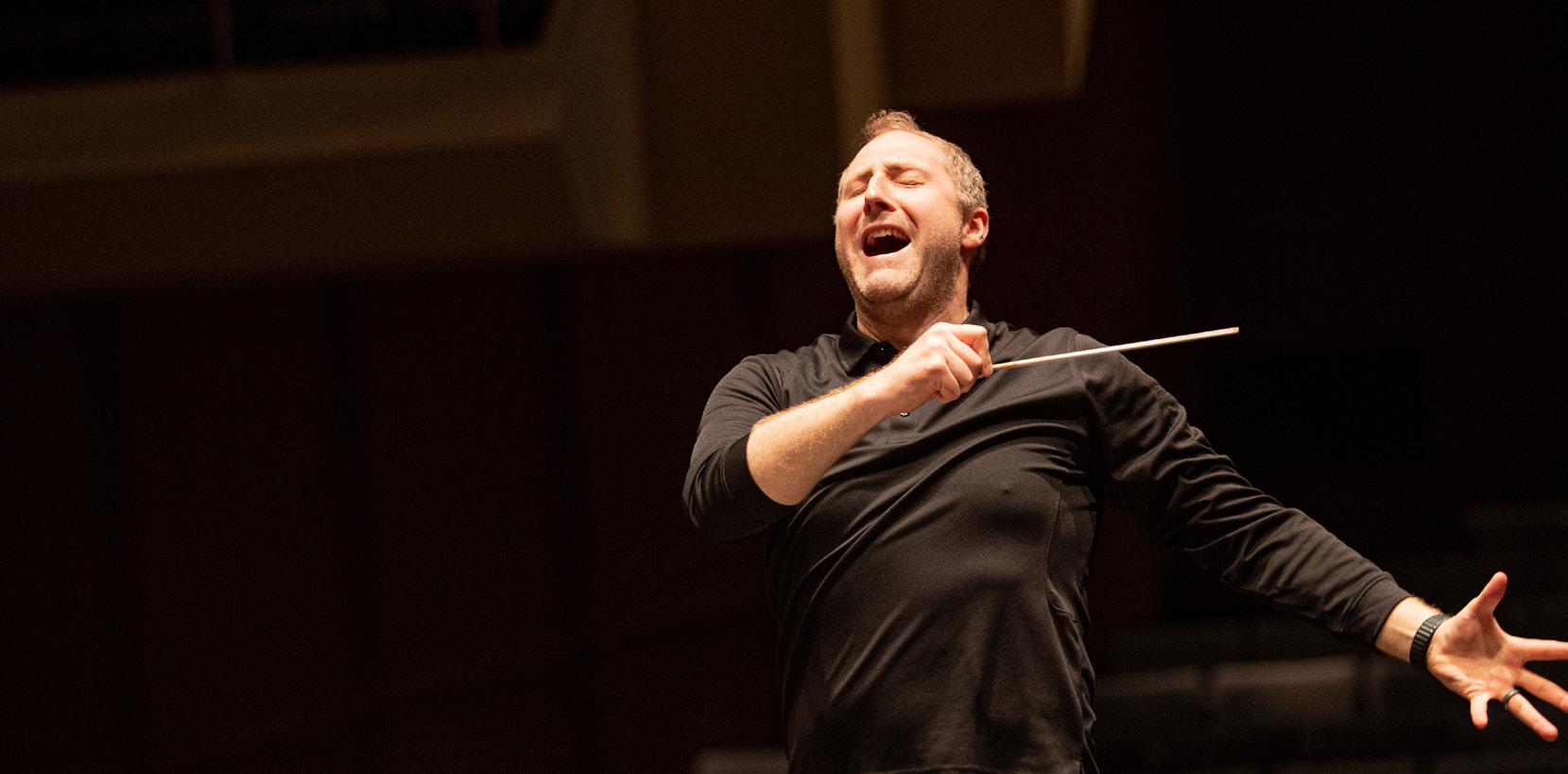

American conductor, Andrew Neer, is known for his dynamic and expressive conducting style. Now completing his second season with the MSO, we are very excited for all that is to come for this great organization in the coming years. He hopes to see the orchestra expand their season to provide more opportunities for families to enjoy the great music the MSO has to offer. This effort is ongoing, but this far, we are expanding the ‘24-25 (our 50th Anniversary) season by two performances. He believes that at the heart of everything, music is the soul of America and provides transformative experiences for those performing and participating in the audience.
Andrew has lived in Michigan (Macomb County) since 1991, he is honored to be part of the Macomb Symphony Orchestra family. He has been honored to lead choruses and conduct operas in and around Metropolitan Detroit. In 2017, he embarked on an international conducting career appearing as a guest conductor with orchestras in Romania and Bulgaria.
Andrew holds a Doctorate of Musical Arts in Orchestral Conducting from the world-renowned University of Michigan School of Music, Theatre, and Dance. He is honored to have studied with mentor Kenneth Kiesler, and all the marvelous faculty at UofM. He attended Central Michigan University (CMU) studying Composition, Trumpet and Music Theatre Performance. He earned two Master of Music degrees in Composition and Conducting, respectively, from Wayne State University. As a composer, he worked under the instruction of Dr. James Hartway, Dr. David Gillingham & late Dr. Jose-Luis Maurtua.
In addition to the Macomb Symphony Orchestra, Andrew is honored to serve as Music Director/Conductor of Warren Symphony Orchestra and Orchestra Sono, and as Artistic Director/Conductor of Oakland Choral Society. In his time away from the orchestras, he makes the most of spending time with his wife, Mary Lynn, and son Eli. He is forever thankful for the enduring support from his family!
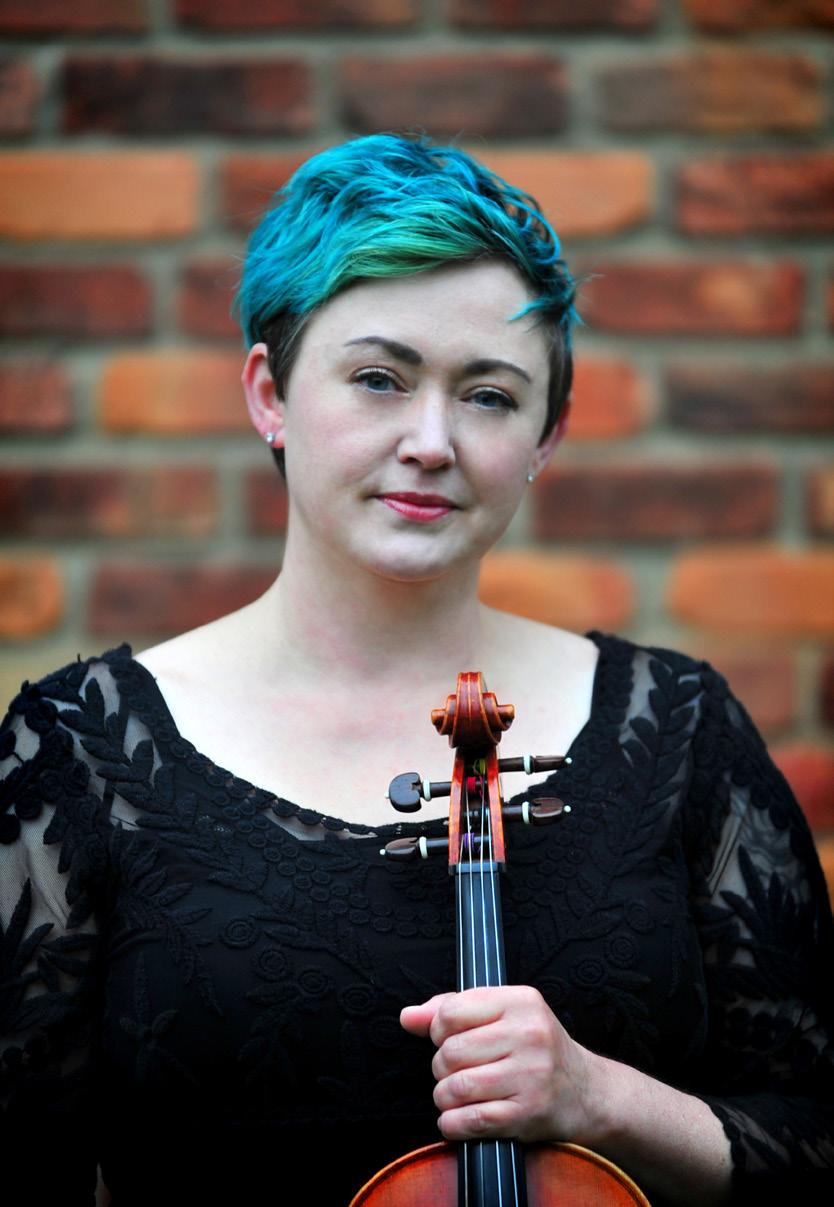
Violinist Judith Teasdle is a native of Pontiac, Michigan and a graduate of the Interlochen Arts Academy. She received a Bachelor’s in Music from Oakland University, where she studied with Lafayette String Quartet members Ann Elliott-Goldschmid and Joanna Hood. She went on to graduate studies with Dr. Walter Verdehr at Michigan State University, earning a Master’s in Violin Performance. She is the Principal 2nd Violin of the Saginaw Bay Orchestra, Oakland Symphony Orchestra and the Warren Symphony. She also performs regularly with the Detroit Opera, Ann Arbor Symphony, Flint Symphony and Lansing Symphony Orchestra, as well as the Detroit Jazz Festival Orchestra.
Her recording credits include Aretha Franklin, De La Soul, Kem, American Idol finalist Jena Irene, Shaun Martin and avant-garde rock group The Sursiks. Judith has also shared the stage with a wide variety of artists, including The Who, Glen Campbell, The Moody Blues, Robert Goulet, Dave Brubeck, Victor Borge, Sarah Brightman, Richard Marx and Disturbed. A resident of Detroit, Michigan, Judith has been a founding member of several string quartets and maintains an active teaching studio.
Conductor | Andrew Neer
Listed in alphabetical order * Denotes Principal ( + Acting Principal) ** Assistant Principal
First Violin
Sherri Marttila (acting concertmaster)
Bethany Backos
Clarke Bonten
Larissa Michel
Mahki Murray
Valerie Palmieri
Anna Redding
Anoush Rophael
Reuben Seward
Yelena Yendovytska
Second Violin
Kimberly Becker *
Rachel Baker
Jennifer Boutin
James Kujawski
Leandro Marten
Michael McGillivray
Thomas Moody
David Nagorsen
Bruce Rutter **
Viola
Constance Marwick +
Stephanie Hooper
Chris Jensen
Fawzi Jeroudi
Jami Kleinert
Heather Riggs
Cello
Gregory Stawick *
Kathleen Bard Chair
Pat Birch
Jason Charboneau
Jennifer Koa
Pat Lewandowski
Boryana Tamasini-Scheer **
Todd Schmitz
Double Bass
Don Lewandowski *
Nancy Wigginton Chair
Grant Phillips
Henri Gross
Jaiden Montgomery
Richard Wiggington
Tom Yates
Flute
Rachel Lucas *
Terry Modawell
Lisa Taormina
Oboe
Amy Kesler *
Rachel Krueger
Sara Hammelef (English Horn)
Clarinet
Casandra O’Brien +
Nolan Cardinas (Bass Clarinet)
Andrew Sprung (E-flat Clarinet)
Bassoon
Fred Hoops *
Michael Wieland
Horn
Gregory Holt *
Phillip Mallender
Brian Nutting
Justin Zak
Trumpet
Rory Powell +
Chris Napier
Nicholas Voisch
Trombone
Larry Huntington *
Martha Farmer
Jason Cash (Bass Trombone)
Tuba
Jeffrey Rideout
Timpani
Nicholas Backos
Percussion
Stephen Badalament *
Joseph Francis
Valerie Hintzen
Lynn Koch
Michael Steele
Ron Strnad
Celeste
Lois Kaarre
Piano
Marina Stojanovska
Robert Conway
Orchestra Personnel Manager
Sherri Marttila
Cover Conductor
Madeleine Krick
Music Librarian
Nicole Tremonti
Assistant Music Librarian
Pat Birch
Oakland Choral Society | Andrew Neer, conductor
Symphonia Chorale | William S. Harrison, conductor
William S. Harrison Chorale | William S. Harrison, conductor
Listed in alphabetical order
Soprano
Mary F. Bennett
Hannah Bonenfant
Sandra Brooks
Janet Brown
Sonya Ellis
Carol Forrester
Rita Gerstheimer-Subert
Ashli Hunter
Linda Isbell
Lisa Keinert
Susan Kohl
Janilla Lee
Mary Sue Livingston
Margaret Lyle
Sarah Mastroianni
Cheryl Meadows
Kristie Michelich
Emilia Mo
Eileen Murphy
Dianne Phillips
Melissa Roberts
Nic Serafyn
Sherri Serafyn
Mary Sosnowski
Laurel Sprang
Soprano
Ari Apel
Jaden Brummel
Ke’iyonie Davis
Diana Helferty
Megan Jankowsky
Ally Nash
Diane Terrell
Shirley Wigman
Stacy Wojcikiewicz
Carmen Zolo
Alto
Carolina Andrakovich
Gina Aula
Breanna Brown
Rosilyn Brown
Jo Busuttil
Sandra Collins
Emily Gay
Anita Goor
Fawn Kopas
Madeleine Krick
Joan McIntyre
Mary Neff
Karen Palmer
Joanne Paul
Cynthia Rutledge
Alicia Steudle
Faye Stevenson
Madelyn Teasley
Mary Weinhold
Em Wolfe
Tenor
Mark Bartnik
Emanuel Curri
Denzel Donald
X. Alexander Durden
Jess Glasel
Karen Griffin
Edward Lemmon
Ted McDonald
Todd Moses
Jay Schumacher
Bob Selvaggi
Mike Wolfe Bass
Glenn Battjes
Carl Clendenning
Christopher Gawel
Alaric Gerstheimer Subert
William Harrison
Bud Kilgore
Mike Phillips
John Rutledge
Jeffrey Saunders
Mariyon Turner
Coleman Ward
Tim Ward
Tim Welch
Macomb Chamber Choir (Coro Piccolo) | Todd Moses, conductor
Alto
Alyssa Bruwier
Anna Clements
Sarah Clements
Devon Fike
Nya Jones
Brooke Pacifico
Renette Woychowski
Tenor
Danté Chambers
Josh Hathon
Alec Pavlik
Ashton Posner
Jacob Schroeder
Vinnie Vitale Bass
Royce Brown
Aiden Debbs
Max Hopton
Dartanyn McJennett
Tyler Schwartz
Eric Wilson

Symphonia Chorale & William S.
Harrison Chorale, Conductor
William Sean Harrison, Sr. is a native of Detroit and is no stranger to the concert stage. Known for his eclectic and unique concert programming and diverse repertoire, he has delighted audiences for over two decades. William is a proud graduate of Detroit’s Cody High School, where has returned as a Music Teacher, and received his formal education at Wayne State University and Indiana University-South Bend. He holds an M.A. in Music and Worship and a doctorate in Music
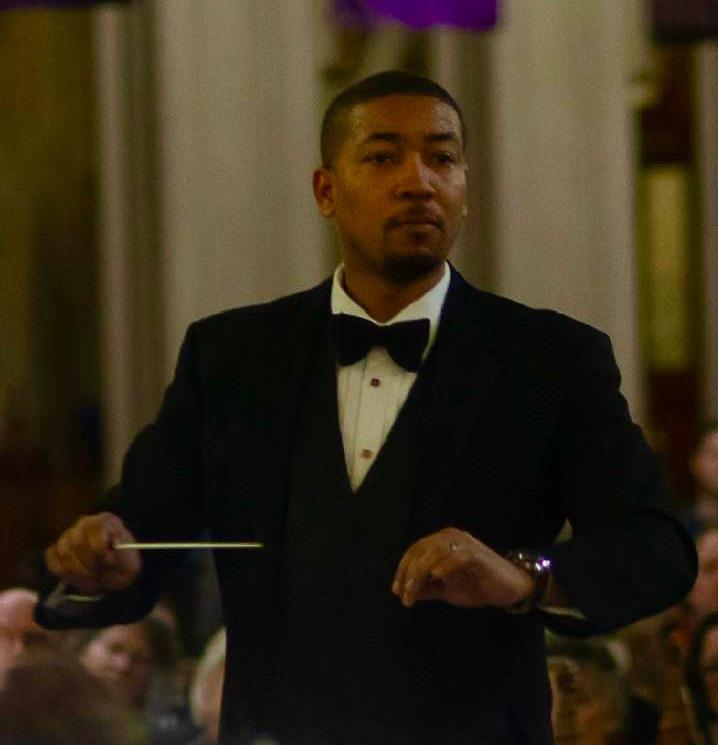
and Worship at Liberty University. His concert stage highlights include Carnegie Hall, Kennedy Center, and Max Fisher. William has been guest keynote speaker at several conferences and universities, including Conservatoire National Supérieur de Musique et de Danse de Paris in France and Chautauqua Institute in New York. In July of 2022, he presented a solo voice recital of Spirituals at St. Paul’s Inside the Wall in Vatican City, Italy. Currently, he serves as the music director of St. Patrick’s Parish in White Lake, MI. William resides in Detroit with his wife Jujuana, daughters Jade and Jennifer, sons William Sean, Jr. and William Jacob Pierce, and their cat, Thelonius.
Chorus Board of Directors
Symphonia Chorale
Mike Phillips, Co-President
Jo Busuttil, Co-President
Karen Palmer, Co-Treasurer
Janet Brown, Co-Treasurer
Dianne Phillips
Bette Stogdill
Jim Stogdill
Melissa Roberts
Joanne McIntyre
Ted McDonald, accompanist
Oakland Choral Society
Mark Bartnik, President
Shirley Wigman, Vice President
Mary Neff
Anita Goor
Lisa Keinert
Sandra Collins
Mary Creager
Nancy Kruger
Mary Neff
Alicia Steudle
Stacy Wojcikiewicz
Shari Fiori, accompanist
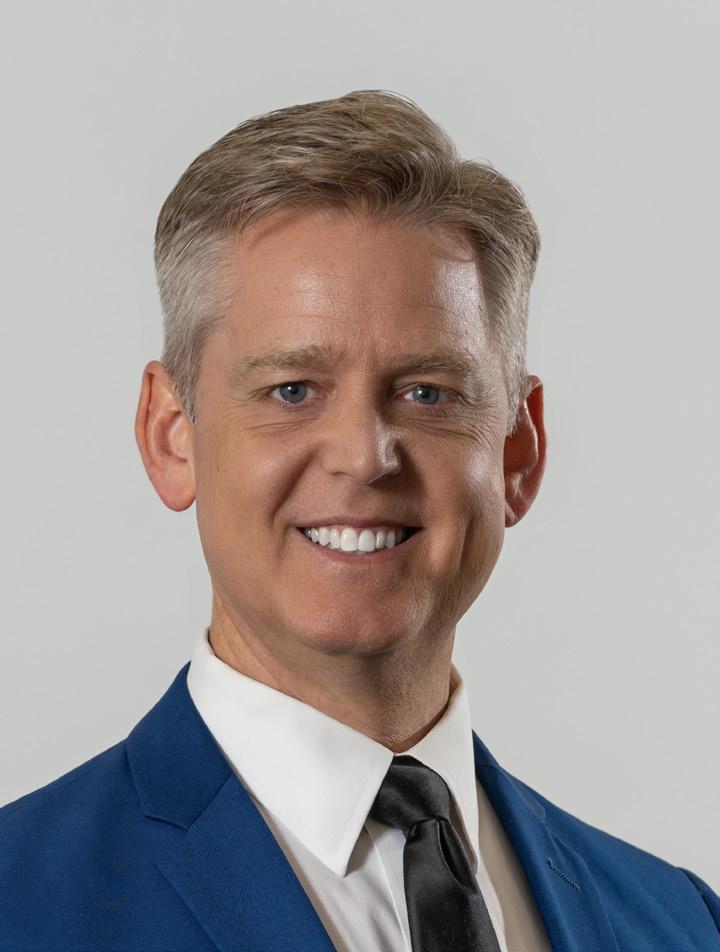
Todd Moses is a graduate of Saginaw Valley State University, Ball State University and Macomb Community College, where he earned his Master of Arts in Teaching, Bachelor of Science in Music Education, and Associate of Arts with a Music Performance Certificate, respectively. He has been a choral director and music educator within Michigan’s public schools from 1992-2017, teaching in Grosse Pointe Public Schools, Romeo Community Schools, and Chippewa Valley Schools. In 2007, he was named a top three finalist for the ArtServe Michigan Governor’s Award for Arts & Culture (Guvvy) in the Arts Educator category, which celebrates and recognizes excellence in the arts throughout the state of Michigan. His choirs have performed at numerous venues around the metropolitan Detroit area, along with consistently ranking with the top choirs of the state. His high school ensembles have been selected to perform at the Michigan American Choral Director Association Conference, the Michigan Youth Arts Festival and the National Festival of the States in Oahu, Hawaii. Additionally, he has served as a vocal clinician since 2001 for Macomb Community College’s Junior High Show Choir Workshop with national choreographer, Andrew Haines, and currently serves as the Director of Choral Activities and Professor of Music at the college. Under his direction is the college’s premier Show Choir [The Macombers], the Concert Choir, the Chamber Choir, the Contemporary A Cappella Ensemble [Expressions], and the High School Gifted & Talented Show Choir [Magic Company]. His choirs perform at The Macomb Center for the Performing Arts and throughout the community with over 50 performing engagements each season.
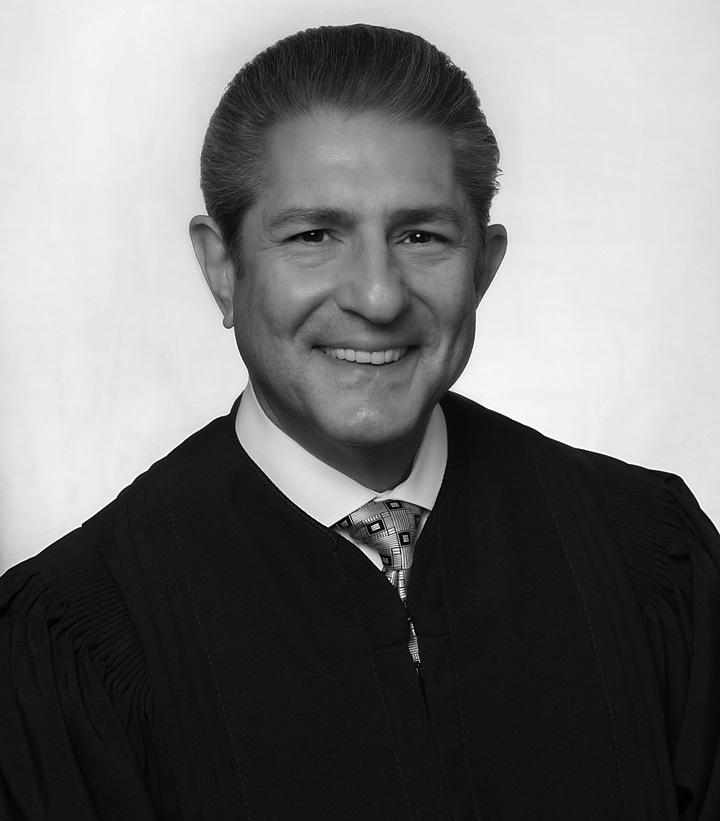
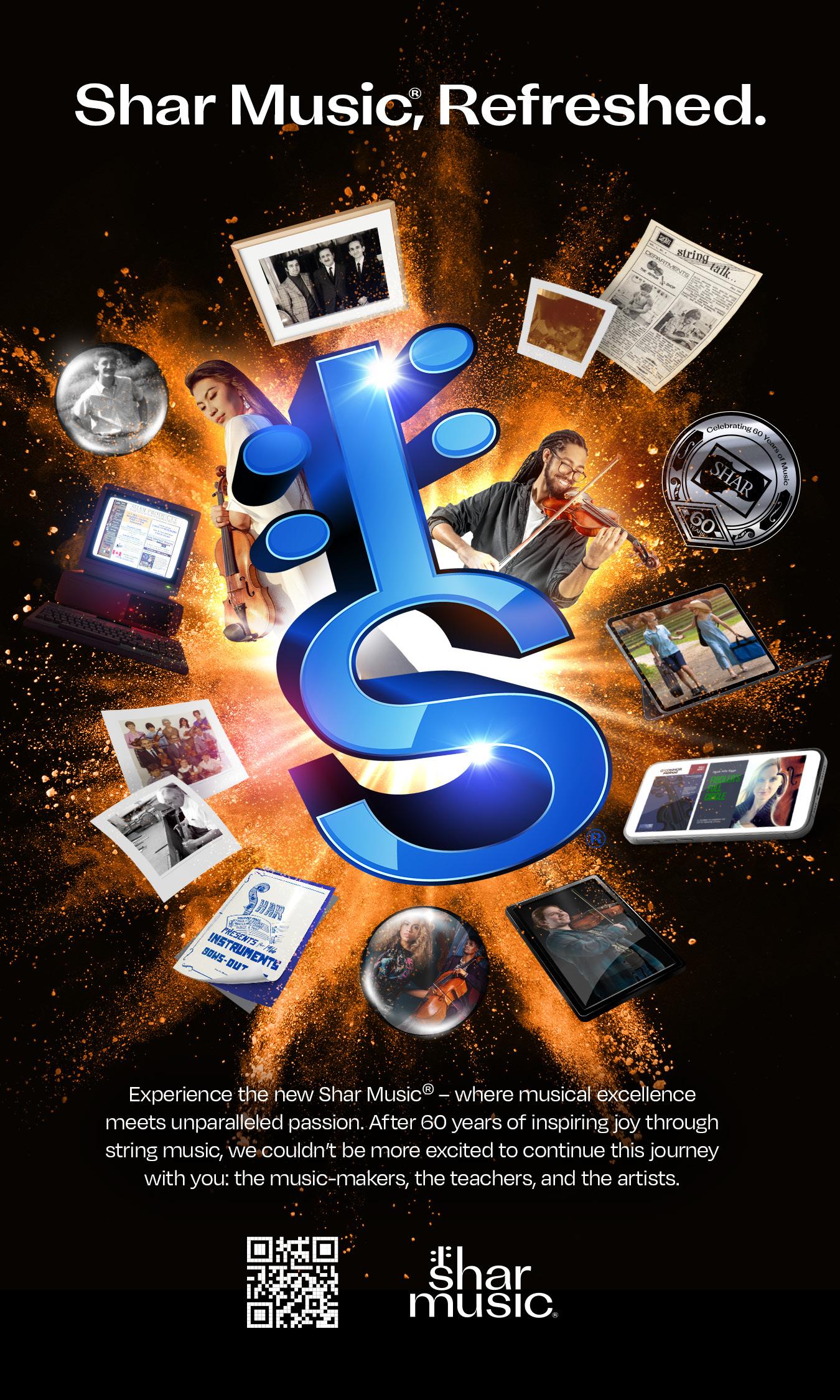
Goitsemang Lehobye was born in Ga-Rankuwa, South Africa and first heard opera performed during a television broadcast featuring the South African Black Tie Opera Ensemble. After finishing school she followed her dream by joining the Black Tie Ensemble’s “Incubator” Scheme where she began learning the tools of the trade of being an opera singer. She worked her way from chorus member to ensemble and solo work and performed in a number of opera productions.
In 2011 Goitsemang won a scholarship to study singing with Hanna van Niekerk and Prof Kamal Khan at the University of Cape Town’s College of Music. She was invited as guest soloist in opera galas featuring Johan Botha and Neil Schicoff. She often performs as soloist with the Cape Town Philharmonic Orchestra, and in October 2015 she premiered a new song cycle by South African composer Bongani Ndodana-Breen, conducted by Perry So. In December 2015 she was invited to perform in a new opera by David Earl in Cambridge, England. 2016 highlights included singing as soloist for Opera Galas with renowned tenor Johan Botha in Cape Town and Johannesburg and touring to Argentina as Serena in the Cape Town Opera production of Porgy and Bess.

Goitsemang moved to the USA at the beginning of 2017 to continue her studies at the University of Michigan (UofM) with Professor Daniel Washington. She won the UofM Friends of the opera Anna Chapekis award in 2017, and performed in a new production of the Ira Gershwin version of Porgy and Bess with the University of Michigan Musical Society. In 2018, she returned to South Africa to sing in the Passion for Opera celebrating the life and work of Angelo Gobbato alongside a host of internationally recognized South African singers, as well as singing in Mahler’s 2nd symphony for the reopening of the City Hall in Cape Town. She was also the chosen soloist for the first ever tour of the Minnesota Symphony Orchestra to South Africa where she premiered a new work by Bongani Ndodana Breen – Harmonia Ubuntu. Performances took place in Minnesota as well as across South Africa and also included Beethoven’s Ninth Symphony.
Goitsemang completed her Master of voice performance in 2018 and started her Specialist in voice performance degree in 2019 at the University of Michigan, USA. She returned to the
Minnesota orchestra for their summer season and again in their winter season performing Dona Nobis by Vaughan Williams. She also performed the role of Mimi from La boheme with the University of Michigan to critical acclaim. In 2021, Goitsemang was offered a position to pursue Doctoral degree at the University of Michigan. That same year she performed in many concerts and sang the role of Miranda Parker from the opera, Rise for Freedom by Adolphus Hailstork.
Marina, one of Macomb Symphony Orchestra’s Artists in Residence, was hailed by the Macedonian Music Society Post as “...an expressive, versatile and fearless pianist.” Dr. Marina Stojanovska made her debut with the Macedonian Philharmonic Orchestra at age 15 and her Carnegie Hall debut in 2021. She moved to the U.S. at age 16 to study on a full scholarship at the Interlochen Music Academy. She earned her Bachelor’s degree in Piano Performance from Lynn Conservatory, holds two piano performance degrees from the Jacobs School of Music at Indiana University, and earned a Doctorate Degree in piano performance from Michigan State University. She has performed as a soloist with the Lynn Symphony Orchestra, Grosse Pointe Symphony and others. She was a five-time First Prize winner of the MSC competition in Skopje, Macedonia. Earlier this year she won First Prize at the Charleston International Competition and the American Atlantic.
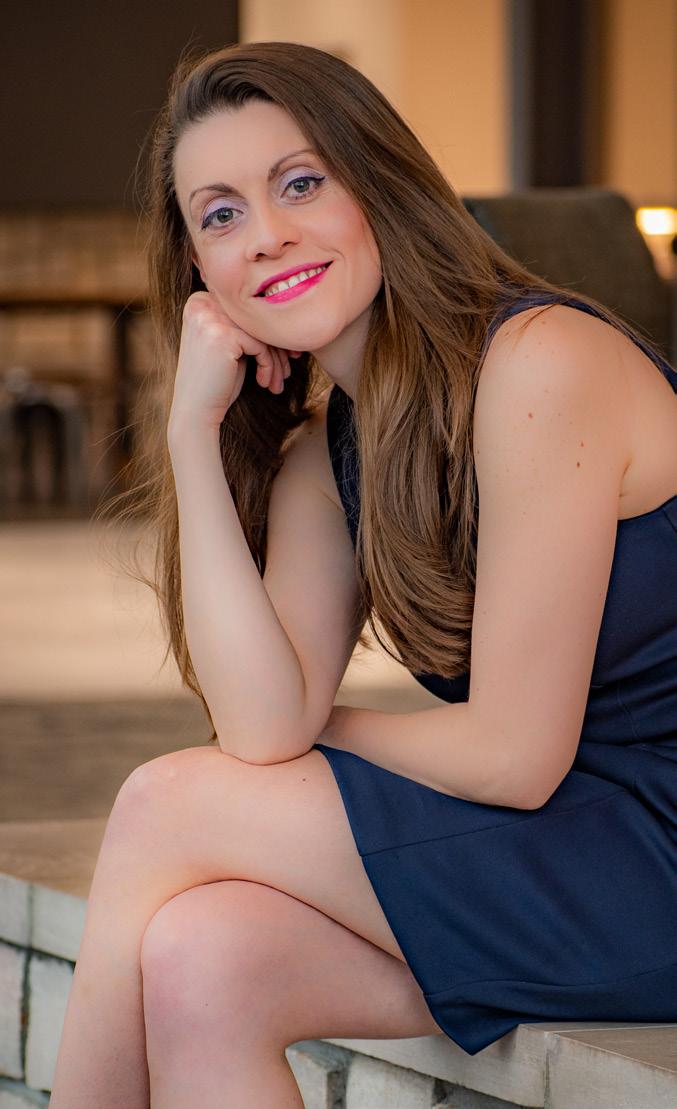
Additionally, she has won First Prize in numerous other international piano competitions including Ohridski, Biseri, Interfest and Liszt-Bartok.
Her performances were broadcast live on Radio Meff, Radio Ternipe, Sitel TV and Kanal 5. In addition to her solo career, she has a piano duo with her sister, Natasha Stojanovska, known as “The Stojanovska Sisters.” The duo was a three-time First Prize Winner of the Macedonia State Competition. She has worked with internationally renowned pianists Olga Kern, Arnaldo Cohen, Norman Krieger, Alexander Toradze, Daniel Shapiro, and Phillipe Entremont. Dr. Stojanovska has given masterclasses and clinics at Interlochen Arts Academy, Alma College, Blue Lake Fine Arts, Sao Paolo State University, University of Skopje, and others. She is currently a pianist at Oakland University and has her private piano studio while also actively performing. She resides at Grosse Pointe with her composer husband,Colin Payne and their son, Connor.
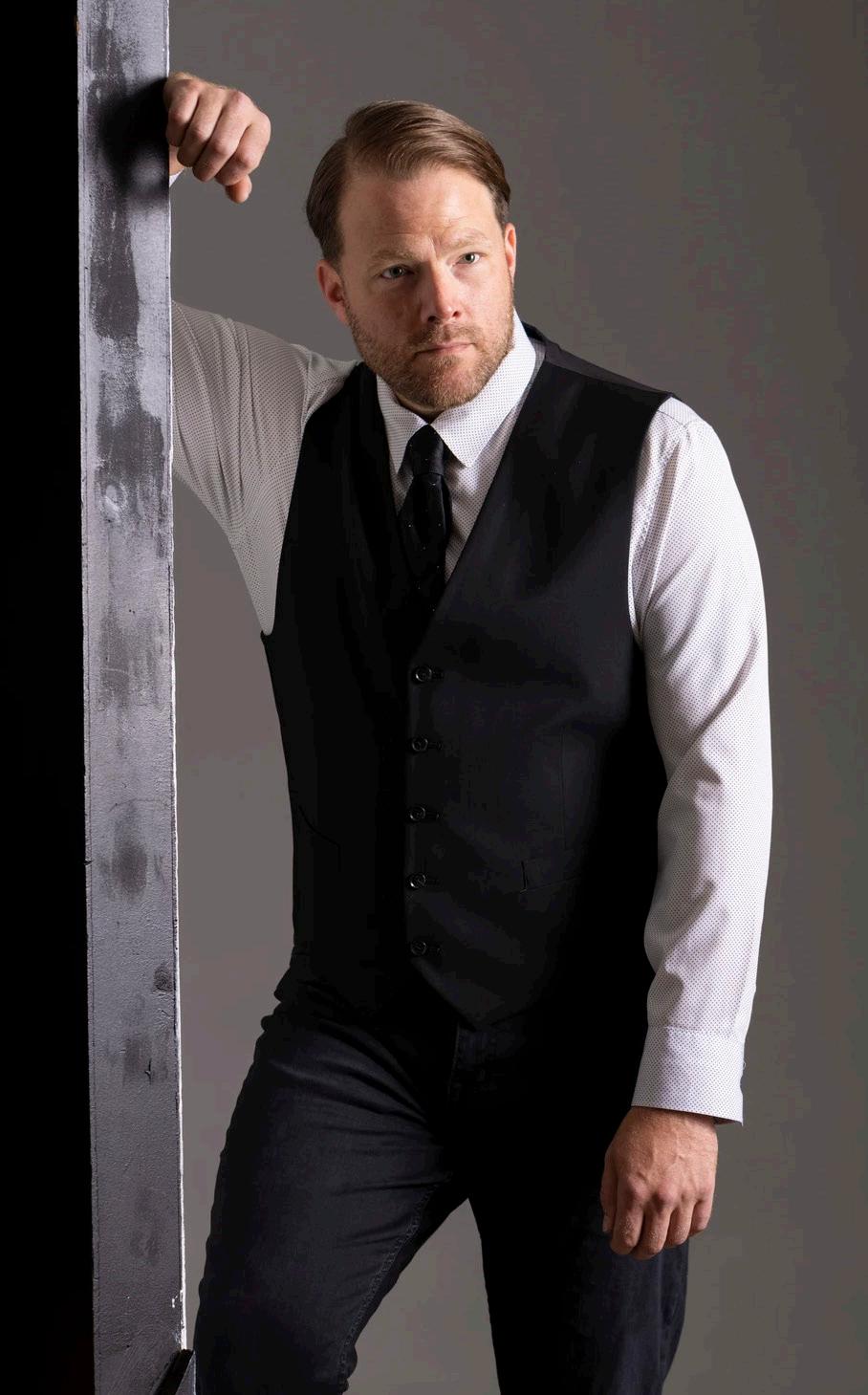
Critics have described Jonathan Lasch as possessing a voice of “arresting color and heft,” that is “smooth and flexible,” “thrillingly resonant and firm-lined,” a singer able to “balance a big, powerful sound with a lighthanded facility with which he makes every note of the fast passage-work perfectly clear,” a performer who is a “master of the stage” and a “tour de force.” This past summer, Dr. Lasch performed and taught in Athens, Greece for the Musical Horizons Conservatory, sang the baritone solo in Carmina Burana for the Green Lake Festival of Music, performed a recital of American music with Caitlin Lynch, soprano and Kathleen Kelly, pianist, featuring the songs of Allen McCullough, which they will record later this year. In July, Jocelyn Hagen’s Amass, with Eugene Rogers conducting and Jonathan Lasch as the baritone soloist, was released by Navona Records. Upcoming performances include a recital at Purdue University, Mozart Requiem with Fort Street Chorale, and recitals and masterclasses in China (Shandong University, Wuhan Conservatory, and Zhejiang Conservatory of Music).
An accomplished concert artist, Lasch has sung Mozart’s Requiem at Carnegie Hall, Händel’s Messiah with Houston Symphony, Milwaukee Symphony, Toledo Symphony, Calvin Orotorio Society, and Fort Street Chorale, the title role in Mendelssohn’s Elijah with Chorus America, Beethoven’s 9th Symphony with the Michigan Philharmonic and Adrian Symphony, the premiere of Rene Clausen’s Passion at Minnesota Orchestra Hall, Copland’s Old American Songs with the Dearborn Symphony, Brahms’ Requiem with Christ Church Grosse Pointe and Community Chorus of Detroit, Orff’s Carmina Burana with the Adrian Symphony, and Dover Beach with The Emerson String Quartet. Most recent operatic roles performed include; The Vicar in Albert Herring with the Princeton Music Festival, Alcindoro in La Boheme with Detroit Opera, Sam in Trouble in Tahiti with Great Lakes Chamber Music Festival and Hannah Before in As One with Aepex Contemporary Performance at Kerrytown Concert Hall. Being a consistent and avid, Jonathan has most recently performed Schubert’s Schwanengesang several times in venues across Michigan.
Mr. Lasch has studied with some of best training programs in the United States, having participated in the Young Artist Programs at Glimmerglass Opera, Seattle Opera, Portland Opera, Chautauqua Opera, Connecticut Opera and the Aspen Opera Center. Dr. Lasch holds Bachelor and Master of Music degrees from The Hartt School at University of Hartford, an
Artist Diploma in Opera from The University of Cincinnati College-Conservatory of Music, and a Doctor of Musical Arts from The University of Michigan School of Music, Theatre, and Dance. Dr. Lasch has taught voice at Concordia College in Moorhead, MN, Adrian College, University of Michigan, and returns to Wayne State University in Detroit as Assistant Professor and Coordinator of Voice. Jonathan enjoys living in Ferndale, Michigan with his wife and three children, and is the Cofounder and Director of ‘Detroit Song Collective’ with his wife, world-renowned soprano, Caitlin Lynch.
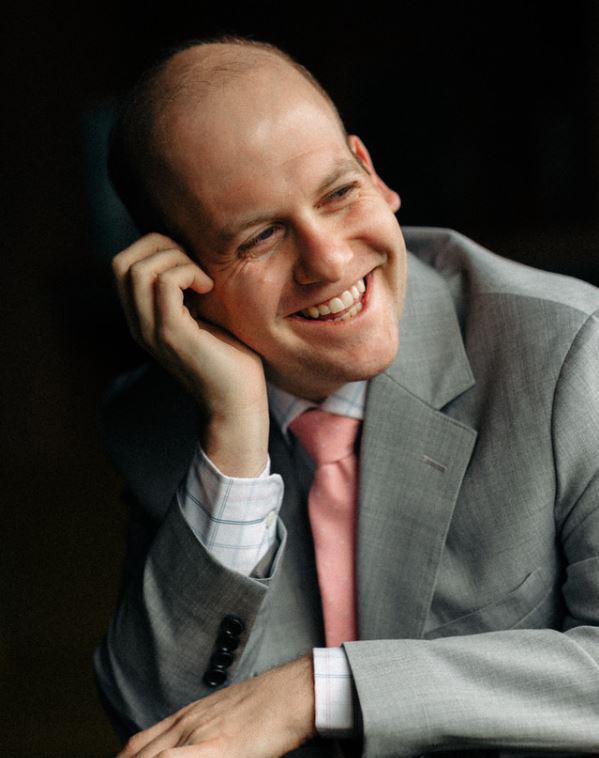
Known for his “exacting and animating performances”, Chicago-based Tenor Justin Berkowitz’ 2023-24 includes performances with Chicago Opera Theater as Chief of Police in Shostakovich’s The Nose, Thespis and Mercure in their slated performances of Platee, and a return to Haymarket Opera Company for Alcina. His 2022-23 season featured performances of L’incornazione di Poppea with Haymarket Opera Company as Arnalta and Nutrice and turns as Mayor Upfold in Albert Herring and as Steve Todd/Arnold Murray in the world-premiere of The Life and Death(s) of Alan Turing, both with Chicago Opera Theater. On the concert stage, the season brought performances of Handel’s Messiah with Niles Philharmonic, and his debut with Rockford Symphony Orchestra and Nielson Chorale for their Carmina Burana In 2021 Berkowitz returned to Chicago Opera Theater’s mainstage for their premiere of Mark Adamo’s Becoming Santa Claus. During their 2020-21 virtual season, Berkowitz appeared in Chicago Opera Theater’s productions of Taking up Serpents and premiered the role of Gil in Matthew Recio’s The Puppy Episode. The 2019-2020 season brought debut performances of Carmina Burana with the Champaign-Urbana Symphony Orchestra, Brazos Valley Symphony in Texas, among others. Recent seasons have seen Berkowitz on the operatic stage in productions with Central City Opera, Haymarket Opera, Opera Naples, Opera on the James, DuPage Opera Theater and St. Petersburg Opera, among others. Berkowitz has appeared onstage as tenor soloist in Carmina Burana with Chicago Philharmonic, Apollo Chorus of Chicago, Annapolis Symphony Orchestra, Detroit Medical Symphony, Northwestern Indiana Symphony, Osh Kosh Symphony, and more. Berkowitz received his Bachelor of Music degree from Lawrence University, and a Master of Music in voice from the University of Michigan.
Sherri Marttila has been an avid violinist since the age of nine. She has completed educational rigors at Interlochen Arts Academy, the Congress of Strings (New York), and the University of Michigan. She holds a Bachelor’s degree in Music Performance from the University of Michigan.
Sherri is the Personnel Manger and Concertmaster for several orchestra spanning from Metropolitan Detroit to Traverse City. Additionally, she performs with the Detroit Opera Theater, Flint Symphony, Saginaw Bay Symphony, Midland Symphony, Traverse Symphony, Lansing Symphony , and the International Symphony.
Sherri has worked with incredible artists including Andrea Bocelli, Aretha Franklin, John Tesh, Sandi Patty, Michael W. Smith, Johnny Mathis, Anne Murray, Alexander Zonjic, Regis Philbin, Harry Connick Jr., Josh Groban, Sarah McLachlan, Amy Grant, Sarah Brightman and wonderful musical groups like The Who, The Eagles, The Temptations, The Ten Tenors, Il Divo, Il Volo, Mannheim Steamroller, Citizen Zero, Warner Brother Symphony, Wimborne Symphony, The Tea Party, and the Celtic Women. She also performed with the Game of Thrones concert series with the Composer and Director, Ramin Djawdi.
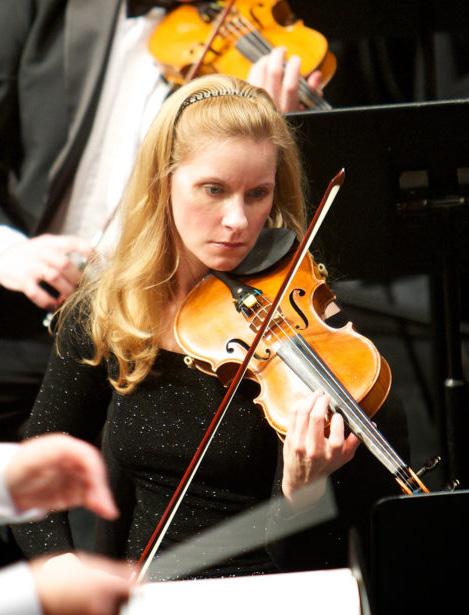
Aside from her active performance schedule, Sherri also has been teaching and coaching in the Flint, Detroit, and Petoskey areas since 1990, and she is the current University of Michigan – Flint instructor of violin, viola, and string chamber music. Sherri employs varying instructional techniques based on the needs of each individual student. She uses the Suzuki method along with traditional methods with a strong emphasis on note reading skills.
Nicole Tremonti joined the Macomb Symphony Orchestra as Music Librarian in September 2022. She was introduced to the music library world in August 2021, when she started as a sales representative at Luck’s Music Library. During her employment, she gained experience as Interim Rental Librarian, as well as the perspective of the publisher on music librarianship. Nicole is grateful for the fond memories and meaningful relationships made at Luck’s. In May 2023, she attended Spoleto Festival USA in Charleston, South Carolina, as the Music Library Apprentice. The following month, Nicole started as Orchestra Librarian Assistant at the Detroit Symphony Orchestra.
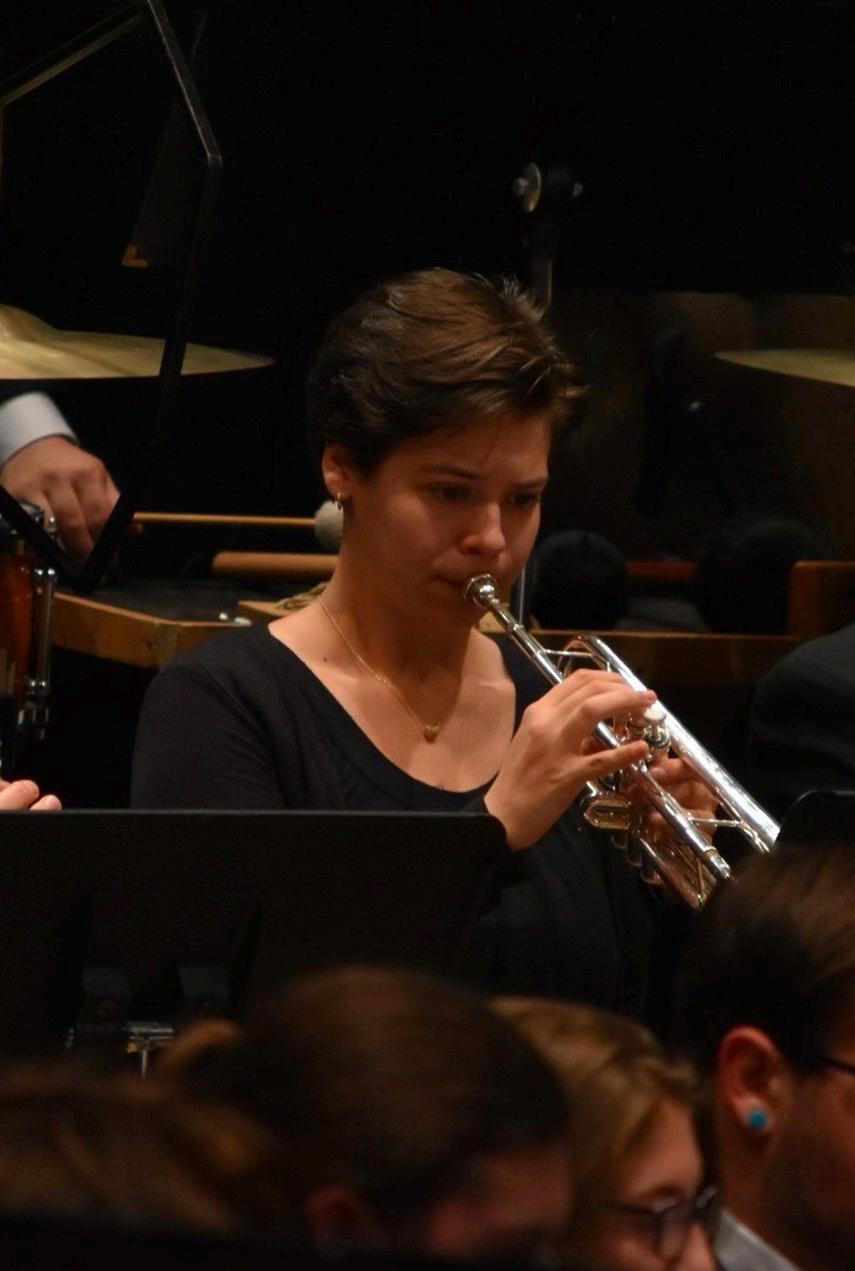
As a musician, Nicole is an active brass player and enjoys freelancing with orchestras and churches in Metro Detroit. Playing trumpet since the age of nine, she studied Trumpet Performance at Oakland University under Dr. Jen Oliverio, Dr. Kenneth Kroesche, Gordon Simmons, and Chris Napier. She has extensive British Brass Band experience from playing cornet, tenor horn, and flugelhorn with the Oakland University Brass Band. Nicole won a caption award for Best Solo Tenor Horn at the 2018 Dublin Festival of Brass. Currently, she plays First Horn with the Five Lakes Silver Band under the direction of Christopher Ward. Other human things Nicole enjoys are rock climbing, tennis, reading, cooking, embroidering, knitting, and chess. She loves her two cats, Sokka and KC (Kitty Cat).





Saturday, April 13 @ 8 PM
Sunday, April 14 @ 3 PM
Conductor | Andrew Neer
Soprano | Goitsemang Lehobye
Tenor | Justin Berkowitz
Bass | Jonathan Lasch
Oakland Choral Society
Macomb Community College, Chamber Singers
Symphonia Chorale
Williams S. Harrison Chorale
Carmina Burana
Carl Orff (1895-1982)
This work is roughly 65 minutes in length with no intermission.
The following pages include program notes by Eldonna L. May, Ph.D, and text translation by David Parlett.
by: Eldonna L. May, Ph.D
Carmina Burana (Cantiones profanae cantoribus et choris comitantibus instrumentis atque imaginibus magicus’) in three scenes (1935-36)
Orchestration:
Soprano, tenor, and baritone soloists, large mixed chorus, a small mixed chorus, and a children’s chorus.
3 flutes (2 doubling piccolos), 3 oboes (1 doubling English horn), 3 clarinets (1 doubling E-flat clarinet and 1 doubling bass clarinet), 2 bassoons and contrabassoon, 4 horns, 3 trumpets, 3 trombones, tuba, timpani, 3 glockenspiels, xylophone, castanets, ratchet, small bells, triangle, antique cymbals, crash cymbals, suspended cymbal, tam-tam, tubular bells, tambourine, snare drum, bass drum, celesta, 2 pianos, and strings
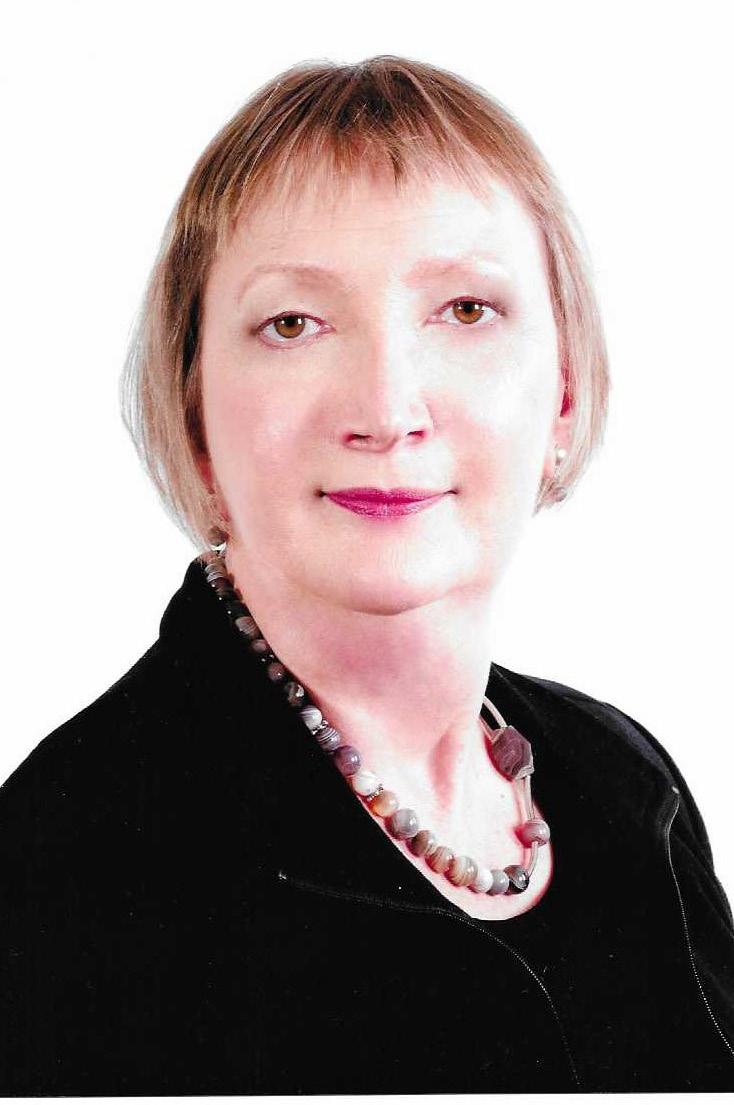
June 8, 1937, Frankfurt Opera. Bertil Wetzelsberger conductor, staging by Otto Wälterlin; sets and costumes by Ludwig Sievert
U.S. Premiere:
January 10, 1954, War Memorial Opera House—San Francisco.
Giovanni Camajani conductor.
Principally remembered for his wide-ranging contribution to music education – his Orff-Schulwerk (1930) is still used today – and for his dramatic cantata, Carmina Burana, written in 1936, Orff came from a musical family and had a number of songs and other pieces published while still in his teens. His style at that time could be described as Post-Romantic, influenced by Schoenberg and Richard Strauss. His ground-breaking research into the way in which music and movement are instinctively and inextricably linked in young children resulted in a radical change in how music was taught in schools throughout Europe and beyond. He became fascinated with the power of primitive rhythms and simple melodies, which gradually found expression in his own compositions. With Carmina Burana he finally eschewed chromaticism and complex polyphony for a deliberately simplified style characterized by its rhythmic energy and the repetition of short melodic phrases supported by elemental block harmonies. Not surprisingly, Orff was dismissed by the critics – one called him ‘a rich man’s banjo player’ – but the work immediately appealed to the public and has remained a great favorite ever since.
When Orff discovered a collection of medieval poems and songs in the mid-1930s, it was a treasure trove. Secluded in a Benedictine abbey near Munich, the original manuscript contained hundreds of secular poems and songs written by university students preparing for the priesthood. Despite their holy career aspirations, these students wrote about earthly, ribald themes of wine, women, and song, and dreamed of a pagan goddess called Fortuna, who controlled humans’ fate with the spin of a wheel. Orff, taken with the imagery of the writing, worked with a Latin scholar to choose 24 of the songs and assembled them into his “scenic cantata” Carmina Burana.
In creating Carmina Burana German composer and music educator Carl Orff drew upon ancient Greek tragedy and utilized models of Baroque theatrum emblematicum, featuring 13thcentury Latin and German poems by the monks of Benediktbeuern; Frankfurt, Städtische Bühnen establishing a musical theatre of impressive force permeated at times by Bavarian peasant life and Christian mystery. Later the work formed the first part of Orff’s theatrical triptych Trionfi which also includes Catulli carmina and Trionfo di Afrodite. Its simple primitive musical language owes much to Stravinsky and has a freshness of invention that eluded the
composer in much of his later work.
Originally conceived for the stage, his best-known composition is most often presented in the concert hall rather than in the opera house. Employing an overall A-B-A structural plan, the work, divided into three main sections that deal with nature, the tavern, and love, and is surrounded by an imposing opening and concluding chorus in praise of Fortuna (“Fortune”), the Empress of the World, the goddess of fate. The text of Carmina Burana derives from a large collection of secular poems of the twelfth and thirteenth centuries, preserved in a manuscript at the Bavarian monastery of Benediktbeuren. The poems are primarily in Latin, the international language of the time, though some are in old French or Middle High German and come from a wide variety of sources. It is somewhat surprising to learn that, apart from some poems that are of a morally uplifting nature, most are bawdy student songs celebrating such un-monklike activities as drinking, gambling, dancing, and lovemaking.
In the composition’s first section entitled, ‘Im Frühling’ and ‘Uf dem Anger’ the awakening of spring is represented by a simple rising unison melody in the chorus, and the ensuing baritone solo praises the tremendous power of love. A series of dances and short choral movements follows, set in medieval German, evoking a peasant spring feast. In the second section, ‘In taberna’, the theatrical element of the work is established in a series of parodies: A baritone solo of exaggerated pathos in which the drunkard seems oblivious to the precarious condition of his soul; the grotesque falsetto singing of a Swan (counter-tenor) which is being roasted; the inebriated psalmody of the Abbot (baritone) from Fool’s paradise; and an orgiastic hymn to earthly enjoyment sung by the male chorus. The final section, ‘Cour d’Amours’ and ‘Blanziflor et Helena’, provides a studied contrast in praising the pleasures of refined courtly love. Individual numbers include a baritone solo in which the lover seeks to make his courtship more seductive by employing a brilliant coloratura vocal line; a flirtatious song for soprano attempting to kindle a young man’s desire; a courting song for double chorus; and, finally, a chorus of uninhibited intensity in praise of Venus. The final number, Blanziflor and Helena, leads back to the opening hymn (popularized in TV, film, and commercials), not only unifying the whole work, but also serving as a reminder that our lives are ever subject to the slings and arrows of outrageous Fortune.
wecare@bcfhsterlingheights.com St.
wecare@bcfhstclairshores.com
O Fortuna, velut luna statu variabilis semper crescis aut decrescis; vita detestabilis nunc obdurat et tunc curat ludo mentis aciem, egestatem, potestatem dissolvit ut glaciem.
Sors immanis et inanis, rota tu volubilis, status malus, vana salus semper dissolubilis, obumbratam et velatam michi quoque niteris; nunc per ludum dorsum nudum fero tui sceleris.
Sors salutis et virtutis michi nunc contraria est affectus et defectus semper in angaria. hac in hora sine mora corde pulsum tangite; quod per sortem sternit fortem, mecum omnes plangite!
Fortune plango vulnera stillantibus ocellis, quod sua michi munera subtrahit rebellis. verum est, quod legitur fronte capillata, sed plerumque sequitur occasio calvata.
In Fortune solio sederam elatus, prosperitatis vario flore coronatus; quicquid enim florui felix et beatus, nunc a summo corrui gloria privatus.
Fortune rota volvitur: descendo minoratus; alter in altum tollitur; nimis exaltatus rex sedet in verticecaveat ruinam! nam sub axe legimus Hecubam reginam.
No. 1, O Fortuna (Chorus)
O how Fortune, inopportune, apes the moon’s inconstancy: waxing, waning, losing, gaining, life treats us detestably: first oppressing then caressing shifts us like pawns in its play: destitution, restitution, melting them like ice away.
Fate, as vicious as capricious, with your wheel whirl us around: evil doings, worthless wooings, crumble away to the ground: darkly stealing, unrevealing, working against me you go: for your measure of foul pleasure I bare my back to your blow.
Noble actions, fair transactions, no longer fall to my lot: powers that make me only to break me all play their parts in your plot: now it’s your time - waste no more time, pluck these poor strings and let go: since the strongest fall the longest let the world share in my woe!
I cry the cruel cuts of Fate with eyes worn red from weeping, whose fickle favours travel straight back into her keeping: as ye read, so shall ye findluck comes curly-headed from the front, but round behind not one hair is threaded!
Dame Fortune once invited me to enjoy her blessing: to riches’ throne exalted me, caring and caressing: but from maximum renown, garlanded and feted, Fate stepped up and threw me downglory dissipated!
Fortune’s wheel goes round and round, down go all my talents; others rising from the ground fly too high to balance: shun then Fortune’s old routine, kings and lords and ladiesfor beneath her throne lies Queen Hecuba in Hades.
Veris leta facies mundo propitiatur, hiemalis acies victa iam fugatur. in vestitu vario Flora principatur, nemorum dulcisono que cantu celebratur.
Flore fusus gremio Phebus novo more risum dat, hoc vario iam stipate fore. Zephyrus nectareo spirans it odore. certatim pro bravio curramus ...ore!
Citharizat cantico dulcis philomena; flore rident vario prata iam serena; turba salit avium silve per amena; chorus promit virginum iam gaudia millena.
Omnia sol temperat purus et subtilis, novo mundo reserat faciem Aprilis; ad amorem properat animus herilis, et iocundis imperat deus puerilis.
Rerum tanta novitas in sollemni vere et veris auctoritas iubet nos gaudere. vices prebet solitas; et in tuo vere fides est et probitas tuum retinere.
Ama me fideliter! fidem meam nota: de corde totaliter et ex mente tota sum presentialiter absens in remota quisquis amat taliter volvitur in rota.
Spring unveils herself again, smiling on creation: Winter’s rule of wind and rain falls in ruination: gaily garlanded and crowned, Flora bids adherence: birds rejoice and woods resound at her reappearance.
Phoebus with his sunny smile cleaves to Flora’s breastboth anew in flowery style colourfully dressed: Zephyrus eke with sweet breath warmly wafts above us, while we strive, as to the death, for the prize of lovers.
Charmingly the nightingale whiles away the hours: meadows merrily regale all the world with flowers: from the woods the bird-flock whirls myriads of flightswhile a dancing ring of girls hints of greater heights. PART
No. 4, Omnia sol temperat (Jonathan Lasch, Baritone)
Sunshine overrules the world peaceably and purely: April with her veil unfurled bares herself demurely; now to thoughts of love anew everyone confesses, gladsomely surrend’ring to Eros’s caresses.
Spring, inspiring once a year Nature’s new condition, bids us follow with good cheer in the old tradition: may the springtime of your youth lead you to discover need to rest in trust and truth faithful to your lover.
Therefore love me faithfully, mark my own devotion: may it be whole-heartedly and with resolution.
I am with you everywhere far away though wending: all who love as I, must bear agonies unending.
Ecce gratum et optatum
ver reducit gaudia: purpuratum
floret pratum, sol serenat omnia. iam iam cedant tristia! estas redit, nunc recedit hiemis sevitia.
Iam liquescit et decrescit
grando, nix et cetera; bruma fugit, et iam sugit
veris tellus ubera. illi mens est mlsera, qui nec vivit nec lascivit sub estatis dextera!
Gloriantur et Ietantur in melle dulcedinis, qui conantur, ut utantur
premio Cupidinis. simus iussu Cypridis gloriantes et letantes pares esse Paridis!
Floret silva nobilis floribus et foliis. Ubi est antiquus meus amicus? hinc equitavit! Eia! Quis me amabit?
Grunet der walt allenthalben. Wa ist min geselle also lange?
Der ist geriten hinnen. Owi! Wer soll mih minnen?
No.
Welcome, season, with good reason: spring restores our old delight: violets grow by the hedgerow, sunshine renders all things bright: so may care give way to funsummer’s coming, winter’s runningnasty winter’s on the run!
Now withdrawing, melting, thawing, snow and ice and all the rest: mists are vanished, earth, half famished, draws new life from summer’s breast: dull and dreary all who shun living, lusting, trysting, trusting in the cheery summer Sun!
Loudly voicing and rejoicing we’re all after Cupid’s prize: we who win it see within it sights reserved for lovers’ eyes; Venus orders - let’s obey: loudly voicing and rejoicing, we shall have her every day!
No. 6, Tanze | Dance (Orchestra)
No. 7, Floret silva nobilis (Chorus)
Forest, wood and lofty bower flourishing with leaf and flower: where is my once lover? Has he another?
He rode away to thwart meAlas! Now who will court me?
Now the greenwood’s newly started where’s my former love departed?
He rode away to thwart meAlas! Now who will court me?
No. 8, Chramer gip die varwe (Chorus)
Chramer gip die varwe mier diu min wengel roete da mit ich die jungen man an ir danch der minnenliebe noete.
Seht mich an, iungen man, lat mich iu gevallen.
Minnet, tugendliche man,
Chapman, let me have some rouge fit for my complexion, so that I may lead young men willy-nilly into my affection.
Look at me, young man, seelet me be your pleasure!
Sir, you are required to love
minnetkliche vrouwen minnet tuot eu hoech gemuet unde lat euch in hoehen eren schauwen.
Seht mich an, iungen man, lat mich iu gevallen.
Wol dir werlt, daz du bist also vreudenreiche. Ich wil dir sin undertan
Durch dein liebe immer sicherlichen.
Seht mich an, iungen man, lat mich iu gevallen.
Swaz hie gat umbe, daz sint alle megede; die wellent an man allen disen sumer gan!
ladies who deserve it; true love elevates the heart; people honour gentlemen who serve it.
Look at me, young man, seelet me be your pleasure!
Bless you, World, for your joys: how shall I repay you? Let me plight my troth to you in your service honour and obey you.
Look at me, young man, seelet me be your pleasure!
Here dancin’ and a whirlin’ they’re everyone a virgin: they plan to go without a man all the summer if they can!
Chume, chume, geselle min ih enbite harte din! ih enbite harte din chume, chume, geselle min! Suzer rosenwarve munt chum unde mache mich gesunt! chum unde mache mich gesunt suzer rosenwarve munt!
REPEAT: SWAZ HIE GAT UMBE
Come, oh come my love to me, all too long I long for thee! all too long I long for thee, come, oh come my love to me! With thy rose-red lips again come and cure me of my pain! come and cure me of my pain with thy rose-red lips again!
REPEAT: HERE DANCIN’ AND A WHIRLIN’
No. 10, Were div werlt alle
Were div werlt alle min von deme mere unze an den Rin, des wolt ih mich darben, des wolt ih mich darben, daz chunichin von Engellant von Engellant lege an minem arme!
Estuans interius ira vehementi in amaritudine loquor mek menti: factus de materia, cinis elementi, similis sum folio, de quo ludunt venti.
Cum sit enim proprium viro sapienti supra petram ponere sedem fundamenti, stultus ego comparor fluvio labenti, sub eodem tramite nunquam permanenti.
If the whole wide world were mine from the sea right down the Rhine I’d surrender all its charms for one chance of holding in my arms of holding in my arms Queen Eleanor of England!
No. 11, Estuans interius (Jonathan Lasch, Baritone)
Boiling over in the mind anger and aggression bitterly compel me to make you my confession: made of earthly elements, dusty and decaying, I’m a leaf that’s blown about when the winds are playing.
Given that the proper thing for a man of wisdom is to build upon a rock following a system I must be a fool - for I’m like a winding river: never holding to a course, deviating ever.
Feror ego veluti sine nauta navis, ut per vias aeris vaga fertur avis; non me tenent vincula, non me tenet clavis, quero mihi similes et adiungor pravis.
Michi cordis gravitas res videtur gravis iocus est amabilis dulciorque favis quicquid Venus imperat labor est suavis que numquam in cordibus habitat ignavis
Via lata gradior more iuventutis, implicor et vitiis immemor virtutis, voluptatis avidus magis quam salutis, mortuus in anima curam gero cutis.
Like a boat that’s lost its crew I’m for ever drifting, like a bird that’s blown about when the wind is lifting; chains have never shackled me never key confined melet me join depravity, to my kind I bind me.
Seems to me, a serious mien means a serious weakness: fun’s a finer thing by far, vies with honey’s sweetness: Venus orders me about in a job I much like: one she never offers to sobersides and suchlike.
Broad the path I travel down, in a youthful fashion: virtue leaves me cold - it’s vice that enflames my passion: self-indulgence I desire more so than salvation: dead my soul, my flesh demands sole consideration.
No. 12, Olim lacus colueram (Justin Berkowitz, Tenor | Chorus [Tenors & Basses])
Olim lacus colueram olim pulcher extiteram dum cignus ego fueram.
Miser, miser! - Modo niger, et ustus fortiter!
Eram nive candidior, quavis ave formosior: modo cum corvo nigrior. Miser, miser! - Modo niger, et ustus fortiter!
Me rogus urit fortiter, gyrat, regyrat garcifer; propinat me nunc dapifer. Miser, miser! - Modo niger, et ustus fortiter!
Mallem in aquis vivere, nudo semper sub aere, quam in hoc mergi pipere.
Miser, miser! - Modo niger, et ustus fortiter!
Nunc in scutella iaceo, et volitare nequeo, dentes frendetes video:
Miser, miser! - Modo niger, et ustus fortiter!
Once I had lakes to live upon, once gloriously I swam along, once - when I used to be a swan.
Poor thing, poor thing- not a raw thing but done like anything!
Once I was whiter than the snow
Finer than any bird I know; now see me - blacker than a crow!
Poor thing, poor thing- not a raw thing but done like anything!
Cook on the spit is curving me, flames sear through every nerve in menow here’s a waiter serving me!
Poor thing, poor thing- not a raw thing but done like anything!
I’d rather be in open air out on a lake - or anywhere but in this spiced-up gourmet fare. Poor thing, poor thing- not a raw thing but done like anything! Now in a serving dish I lie and I have lost the power to flyand grinding molars greet the eye.
Poor thing, poor thing- not a raw thing but done like anything!
No. 13, Ego sum abbas (Jonathan Lasch, Baritone | Chorus [Tenors
Ego sum abbas Cucaniensis et consilium meum est cum bibulis, et in secta Decii voluntas mea est, et qui mane me quesierit in taberna post vesperam nudus egredietur, et sic denudatus veste clamabit:
Wafna, wafna!
quid fecisti sors turpissima? Nostre vite gaudia abstulisti omnia!
Wafna, wafna!
I am the abbot of Cockaigne, and I take counsel with my drinking companions, and my persuasion is that of the gambling fraternity, and if anyone consults me in the tavern at matins, come vespers, he’ll have lost the shirt off his back: and being thus stripped to his birthday suit will cry Save me! Save me!
What have you done, god-forsaken dice?
How you make us sacrifice our only kind of paradise! Save me! Save me!
In taberna quando sumus non curamus quid sit humus sed ad ludum properamus cui semper insudamus: quid agatur in taberna ubi nummus est pincerna hoc est opus ut queratur si quid loquor, audiatur.
Quidam ludunt, quidam bibunt, quidam indiscrete vivunt. Sed in ludo qui morantur, ex his quidam denudantur, quidam ibi vestiuntur, quidam saccis induuntur. Ibi nullus timet mortem, sed pro Baccho mittunt sortem:
Primo pro nummata vini, ex hac bibunt libertini; semel bibunt pro captivis, post hec bibunt ter pro vivis, quater pro Christianis cunctis, quinquies pro fidelibus defunctis, sexies pro sororibus vanis, septies pro militibus silvanis.
Octies pro fratribus perversis, nonies pro monachis dispersis, decies pro navigantibus, undecies pro discordantibus, duodecies pro penitentibus, tredecies pro iter agentibus. Tam pro papa quam pro rege bibunt omnes sine lege.
Bibit hera, bibit herus, bit miles, bibit clerus, bibit ill, bibit illa, bibit servus cum ancilla, bibit velox, bibit piger, bibit albus, bibit niger, bibit constans, bibit vagus, bibit rudis, bibit magus.
In the tavern when we’re drinking, though the ground be cold and stinking down we go and join the action with the dice and gaming faction. What goes on inside the salon where it’s strictly cash per gallon if you’d like to know, sir, well you shut your gob and let me tell you.
Some are drinking, some are playing, some their vulgar side displaying: most of those who like to gamble wind up naked in the scramble; some emerge attired in new things, some in bits and bobs and shoestrings: no one thinks he’ll kick the bucket dicing for a beery ducat.
First to those who pay for wallowing, then we layabouts toast the following: next we drink to all held captive, thirdly drink to those still active, fourthly drink to the Christian-hearted, fifthly drink to the dear departed, sixthly to our free-and-easy sisters, seventhly to all out-of-work enlisters.
Eighthly drink to friars deconverted, ninthly, monks from monast’ries diverted, tenthly, sailors of the oceans, eleventhly, louts who cause commotions twelfthly, those who wear the penitential thirteenth, and whose journey is essential; to this fat pope, to that thin king who the hell cares why they’re drinking:
Drinking tinker, drinking tailor, drinking soldier, drinking sailor, drinking rich man, drinking poor man, drinking beggarman, thief and lawman, drinking servant, drinking master, drinking mistress, drinking pastor, drinking doctor, drinking layman, drinking drunkard, drinking drayman:
Bibit pauper et egrotus, bibit exul et ignotus, bibit puer, bibit canus, bibit presul et decanus, bibit soror, bibit frater, bibit anus, bibit mater, bibit ista, bibit ille, bibunt centum, bibunt mille:
Parum sexcente nummate durant, cum immoderate bibunt omnes sine meta, quamvis bibant mente leta, sic nos rodunt omnes gentes et sic erimus egentes. Qui nos rodunt confundantur et cum iustis non scribantur!
Drinking rude man, drinking proper, drinking tiddler, drinking whopper, drinking scholar, drinking gypsy, drinking drunk or maudlin tipsy, drinking father, drinking mother, drinking sister, drinking brother, drinking husbands, wives and lovers and a hundred thousand others -
Half a million pounds would never pay for all we drink together: for we drink beyond all measure, purely for the sake of pleasure: thus you see us, poor and shoddy, criticised by everybodyGod grant that they be confounded when at last the trump is sounded! Amor volat undique captus est libidine. Iuvenes, iuvencule coniunguntur merito. Siqua sine socio, caret omni gaudio; tenet noctis infima sub intimo cordis in custodia: fit res amarissima.
No. 15, Estuans interius (Goitsemang Lehobye, Soprano | Chorus [Children])
Love is flitting all around with desire conjointly bound, young men and young women go fast entwined, and rightly so! But a girl without a mate suffers an unhappy fate, for her heart is locked up tight deep down inside freezing in unending night... Oh, but that’s a bitter sight!
No. 16, Dies, nox et omnia (Jonathan Lasch, Baritone | Chorus)
Dies, nox et omnia michi sunt contraria, virginum colloquia me fay planszer, oy suvenz suspirer, plu me fay temer.
O sodales, ludite! vos qui scitis, dicite; michi mesto parcite grand ey dolur! attamen consulite per voster honur.
Tua pulchra facies, me fay planszer milies, pectus habet glacies. a remender, statim vivus fierem per un baser!
Stetit puella rufa tunica; Si quis eam tetigit, tunica crepuit.
Eia!
Be it night or be it day in my timeless disarray, hearing maidens chattering makes me weep, and often sigh and, most of all, scares me.
O my friends, a jeu d’esprit, calls on your philosophy to dispel my misery: great is my grief bids you bend an ear to me by your honor.
Of your face the loveliness causes me to weep sans cessethat you have a heart of ice: as a remedy, you could bring me back to life with a kiss.
No. 17, Stetit puella (Goitsemang Lehobye, Soprano)
There stood a girl who had a tunic of bright red: if anyone touched her they’d set that dress astir! Aha!
Stetit puella, tamquam rosula; facie splenduit, os eius floruit. Eia!
No. 18, Circa
Circa mea pectora multa sunt suspiria de tua pulchritudine, que me ledunt misere.
Manda liet, manda liet, min geselle chumet niet.
Tui lucent oculi sicut solis radii, sicut splendor fulguris, qui lucem donat tenebris.
Manda liet, manda liet, min geselle chumet niet.
Vellet deus, vellent dii, quod mente proposui: ut eius virginea reserassem vincula.
Manda liet, manda liet, min geselle chumet niet.
She stood upon her toes just like a little rose: her face shone bright and fair, and red lips blossomed there. Aha!
Down inside the soul of me sighs consume the whole of me oh, for all your loveliness, cause of all my heart’s distress: Lackaday, tackaday, will she never come my way?
How the sparkling of your eyes dims the sun that scours the skies! like a lightning streak it flings brightness down on shadowed things. Lackaday, tackaday, will she never come my way?
May the gods of love be kind to the plan I have in mindshatter to nihility her chains of virginity. Lackaday, tackaday, will she never come my way?
No. 19, Si puer cum puella (Jonathan Lasch, Baritone | Chorus [Tenors & Basses])
Si puer cum puellula moraretur in cellula, felix coniunctio! Amore suscrescente, Amore suscrescente, pariter e medio propulso procul tedio, propulso procul tedio, fit ludus ineffabilis membris, lacertis, labiis.
Si puer cum puellula
moraretur in cellula, felix coniunctio!
Veni, veni, venias, ne me mori facias, hyria, hyrie, nazaza, trillirivos, trillirivos.
Pulchra tibi facies, oculorum acies, capillorum series, o quam clara species!
Rosa rubicundior, lilio candidior, omnibus formosior, semper in te glorior!
If ever boy and girl presume to linger in a little roomhappy their communion! As yearning grows to burning as yearning grows to burning equally between the two they’ll let their inhibitions go, they lose their inhibitions - oh! Into a thrilling game they fall of lips and legs and limbs and all... If ever boy and girl presume to linger in a little roomhappy their communion!
No. 20, Veni, veni, venias(Chorus)
Come oh come oh come to me or I die of misery! hyria, hyrie, nazaza, trillirivos, trillirivos.
Never saw a face so fair, bright the eyes that sparkle there, flowing waves of golden hairyou’re a picture past compare!
Redder than the rose’s hue, whiter than the lily’s, too, lovelier than all in viewI will always worship you!
No. 21, In trutina mentis dubia (Goitsemang Lehobye, Soprano)
In trutina mentis dubia fluctuant contraria lascivus amor et pudicitia.
Sed eligo quod video, collum iugo prebeo; ad iugum tamen suave, suave transeo.
In two minds, I find my mind to be turning over helplessly whether to favour Venus - or virginity. But I choose as best I see, bow the head, and willingly into that sweetest yoke of all surrender me.
No. 22, Tempus est iocondum (Jonathan Lasch, Baritone | Goitsemang Lehobye, Soprano | Chorus)
Tempus est iocundum, o virgines, modo congaudete vos iuvenes.
Oh, oh, oh, totus floreo, iam amore virginali totus ardeo, novus, novus amor est, quo pereo.
Mea me confortat promissio, mea me deportat negatio.
Tempore brumali vir patiens, animo vernali lasciviens.
Mea mecum ludit virginitas, mea me detrudit simplicitas.
Veni, domicella, cum gaudio, veni, veni, pulchra, iam pereo.
Dulcissime total tibi subdo me...
Ave formosissima, gemma pretiosa, ave decus virginum, Virgo gloriosa, ave mundi luminar, ave mundi rosa, Blanziflor et Helena, Venus generosa!
Out you come - it’s playtime you girls, again! Join them in the May-time, young gentlemen!
Oh, oh, oh, merrily we go! now I have a darling who has set my heart aglow: novel, novel, novel is the love that slays me oh!..
Promises you make me are ecstasy, but when you forsake me they’re agony!
In the winter season we’re serious: when the sap has risen, lascivious!
How can I have fun if I’m innocent? How I am undone if I’m ignorant!
Come - with joy complying renew my love: come along - I’m dying for you, my love!
No. 23, Dulcissime (Goitsemang Lehobye, Soprano)
My darling love now I’ll give you all I have...
No. 24, Ave formosissima (Chorus)
Hail to thee, thou priceless gem, perfect and resplendent: hail, thou pride of maidenhood, virgin most transcendent: hail, thou Rose of all the World, Light all lights abasing: Blanchefleur and Helen, thouVenus all-embracing.
No. 25, O Fortuna (Chorus) - REPEAT No. 1
Welcome to this concert by the Macomb Symphony Orchestra.
Just as the music you hear today enriches your life, so does the gift of good vision.
At Lakeside Ophthalmology Center we are committed to providing the highest quality eye care so you may continue to enjoy the many beautiful things life has to offer.

Robert G. Mobley, M.D. - Ophthalmologist 42524 Hayes Road, Suite 400 (Executive Square, South of 19 Mile Road) Clinton Township, Michigan 48038
Telephone today for your appointment 586-263-1168

Present this program at our office and receive a 20% discount on your complete eye exam.
The Macomb Symphony Orchestra Board of Directors extends their appreciation to all the musicians, past and present, that have dedicated their lives to the arts this community. It is the passion of each artist that brings their collective talents together in creating so many fine performances.
CHAIR/PRESIDENT
Kathleen Bard
VICE PRESIDENT
Todd Schmitz
TREASURER
David Nagorsen
MEMBERS
Thomas Cook
Gary Flemming, PhD
Fred Hoops
David Zidel
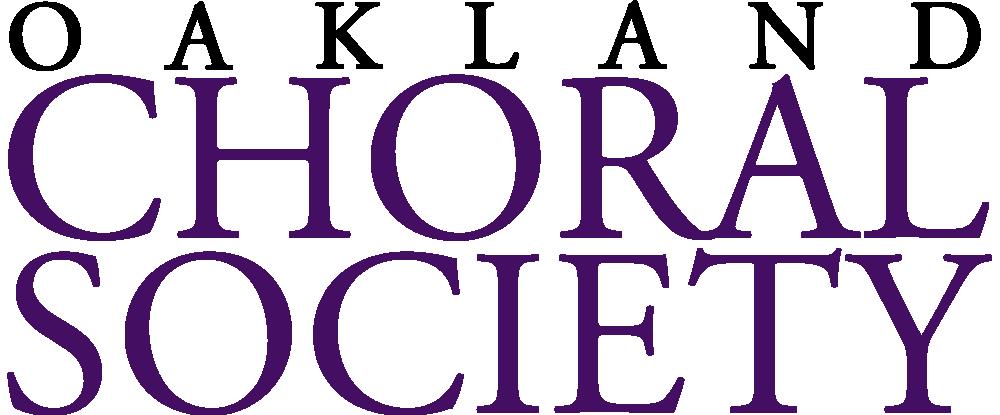
Congratulations to the MSO on their 2023-24 season! OCS is accepting new members!
If you or someone you know, enjoys singing and wants to perform with the Macomb Symphony, inquire below! www.oaklandchoralsociety.org

CORPORATE SPONSORSHIP
19 Mile Senior Housing, LLC
Achatz Handmade Pie Co. LLC
Allen Family Foundation
Anderson, Eckstein and Westrick, Inc.
Bagnasco & Calcaterra Funeral Home
Bank of America Investments
Butzel Long Charitable Trust
Creative Asset Solutions LLC
DTE Foundation
Ernie’s The Grill
Flute Specialists Inc.
Four County Community Foundation
Friends of Polish Art
Gingrich Agency
Huber-Breese Music, Inc.
Huron-Clinton Metroparks
Jacqueline and Joseph Lovejoy
Kiwanis Club of Clinton Townshipv
Lakeside Opthalmology Center
Laura’s Fashion Boutique
Paul Hornberger Piano Service
Peter Lucido
Piano Place Michigan LLC
Pranzo Bags
Printing By Johnson
Psarianos Violins Ltd
PT in the D
Richter’s Beautification Inc.
Serra Buick GMC Cadillac
Shar Music
Dr. Mark and Linda Stout
Suzanne Romadan, MD PC
Hon. Joseph Toia
Video Library / Mrs. William Carley
Viviano Flower Shop, Inc.
Wilson Fine Violins
CHAIR SPONSORS ($2000+)
Kathleen Bard
Thomas Cook
Kirsten and Stephen Redding
Richard Wigginton In memory of Nancy Wigginton
CONDUCTOR’S CIRCLE($250+)
Gary Flemming
Kristine and James Guillen
Johann and Blondine Klimbach
Miriam and Muriel Lenz
Kingsley Sears
Miriam C. Lenz Trust
Muriel E. Lenz Trust
Donald and Patricia Lewandowski
Maria and Richard Schneider
COMPOSER’S CIRCLE ($100+)
Daniel Coakley
Rachael Torres Harla
Rebecca & David Hoerner
Robert Johnson
Marvin Kerscher
COMPOSER’S CIRCLE (cont.)
John & Lynn Kinch
Adrian Kreger
LollipopKids
Thomas and Marie Miller
Robert & Joyce Minch
Andrew Neer
Raymond and Melanie Palmatier
Darrett Pullins
John & Tonia Reinhard
Donald Ritzenhein and Katherine Grenda
Ron & Carol Rose
Dr. Gary Scavnicky
Todd Schmitz
John and Ellen Smith
Dr. Marianne Stefan
David Stewart
Anita Suarez
Marguerite Tiemann
Leon VanPoelvoorde
James Varty
Dr. W. Kent & Terri Voigt
Ken Voigt
Janet Weber in memory of William Rutledge
FRIENDS OF THE MSO ($50-$99)
Arthur Dries Revocable Trust
Richard Kowalewski
Genevieve Lenda
Shelly Rouse-Freitag
Marjorie Schutter
Nicole Tremonti
The Macomb Symphony is committed to bringing the arts to the Macomb community. Please consider making a contribution to make a lasting impact on our community, and arts and culture.
We invite you to join the roster of supporters who share in this mission.
To contribute visit: macombsymphony.org Or scan the QR code below

The Macomb Symphony Orchestra is a 501c-3 non-profit organization.




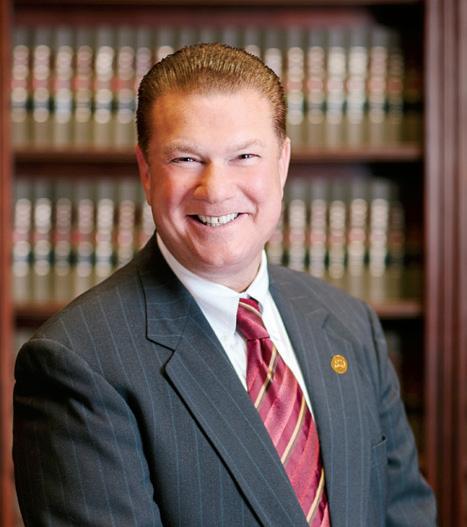


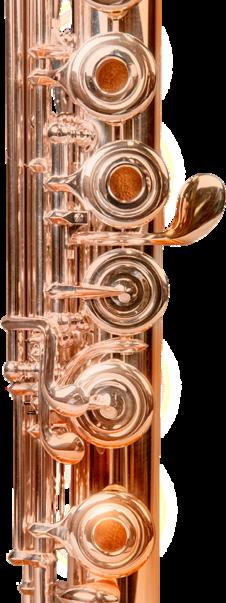
the Macomb Symphony Orchestra for 49 years of great music and service to the community.

Congratulations and Best Wishes on your 49th season of making great music.


 Joe and Jackie Lovejoy
Joe and Jackie Lovejoy

CONGRATS ON ANOTHER SUCCESSFUL YEAR, WISHING THE BEST FOR THIS SEASON.

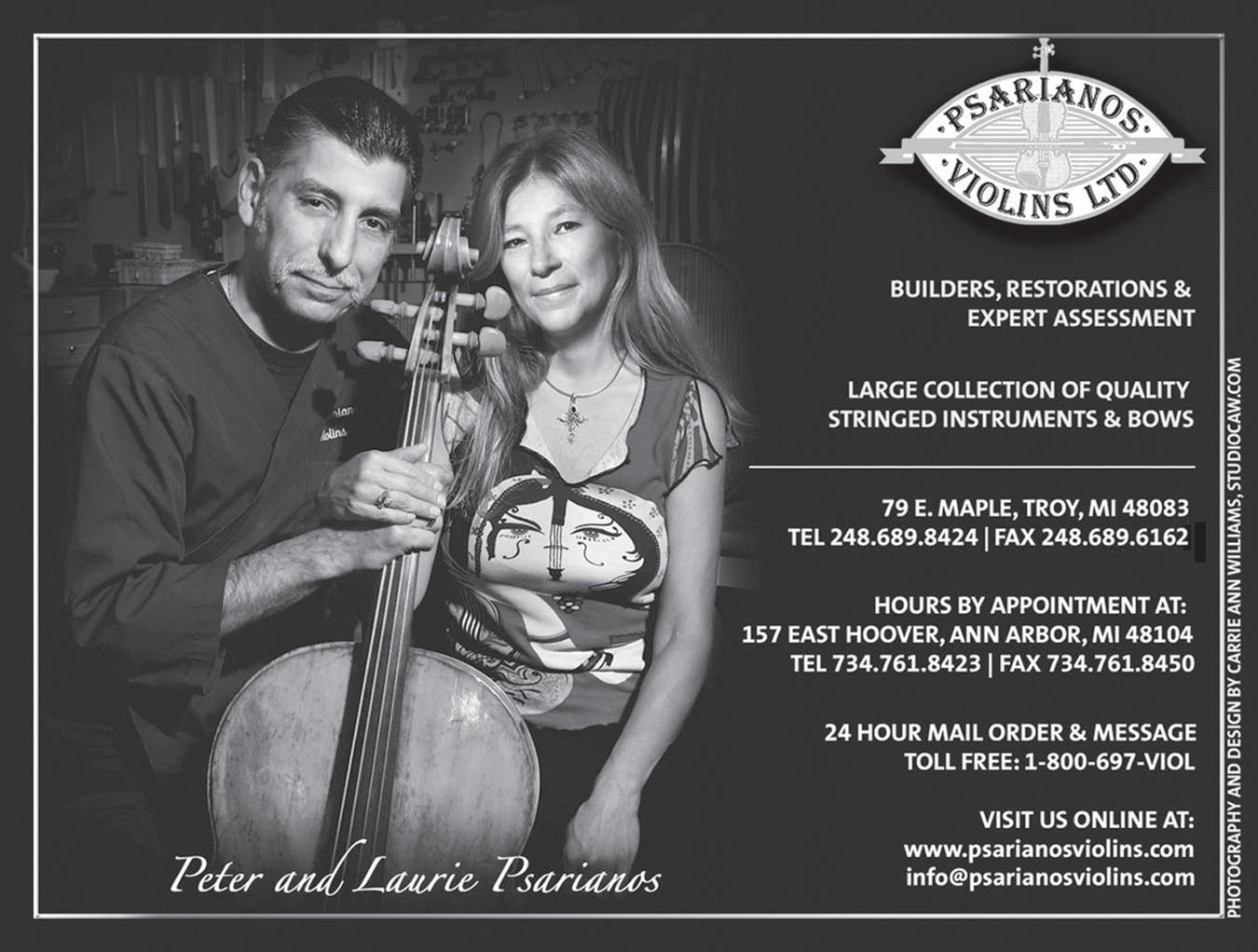

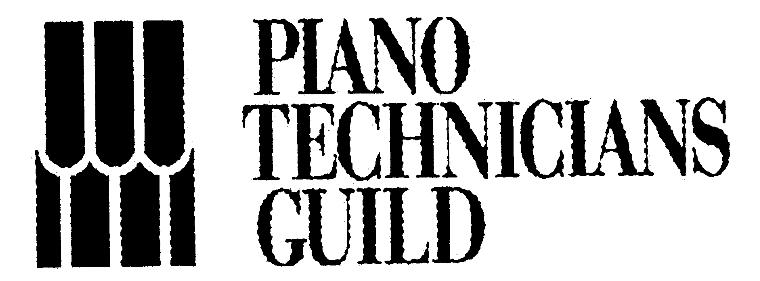




Promote your business by advertising with Macomb Symphony Orchestra!
Scan the QR Code or email: Marketing@macombsymphony.org


Monitoring Michigan’s Media
• Was your business or client mentioned on the local news?
• Do you need that story for your next meeting or archive?
• We maintain a two-month library!
Toll Free (888) 662-7159
• Phone (248) 435-7159
www.videolibrarymichigan.com
• Fax (248) 435-7162

Sunday, October 6, 2024
Carlos Simon: TALES, a Folklore Symphony & Mussorgsky: Pictures at an Exhibition
Sunday, November 17, 2024
Featuring - Barber, Knoxville Summer of 1915 and more favorites!
Sunday, December 15, 2024
Bach to the Movies - Bach, Magnificat & holiday movie favorites!
Sunday, February 2, 2025
Journey through Romance & Superheros with your favorite Marvel and DC movie themes.
Sunday, March 2, 2025
Featuring Detroit Symphony flutist Amanda Blaikie performing Nielsen Flute Concerto & more!
Wednesday March 12, 2025 (9:30 & 11 AM)
Youth Engagement Concert
Sunday, May 4, 2025
Star Wars - May the Force be with you!
All performances are at 3 PM and take place at the Macomb Center for the Performing Arts.
Programs are subject to change, tickets will go on sale mid-summer. Subscribe on our website to our digital newsletter for more updates!

